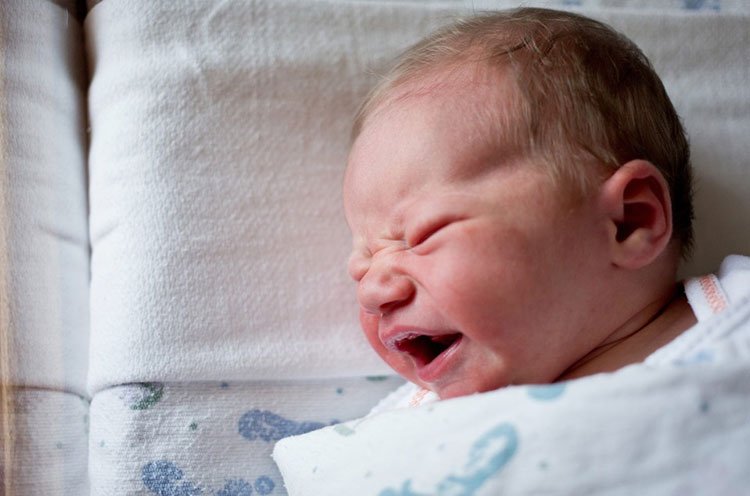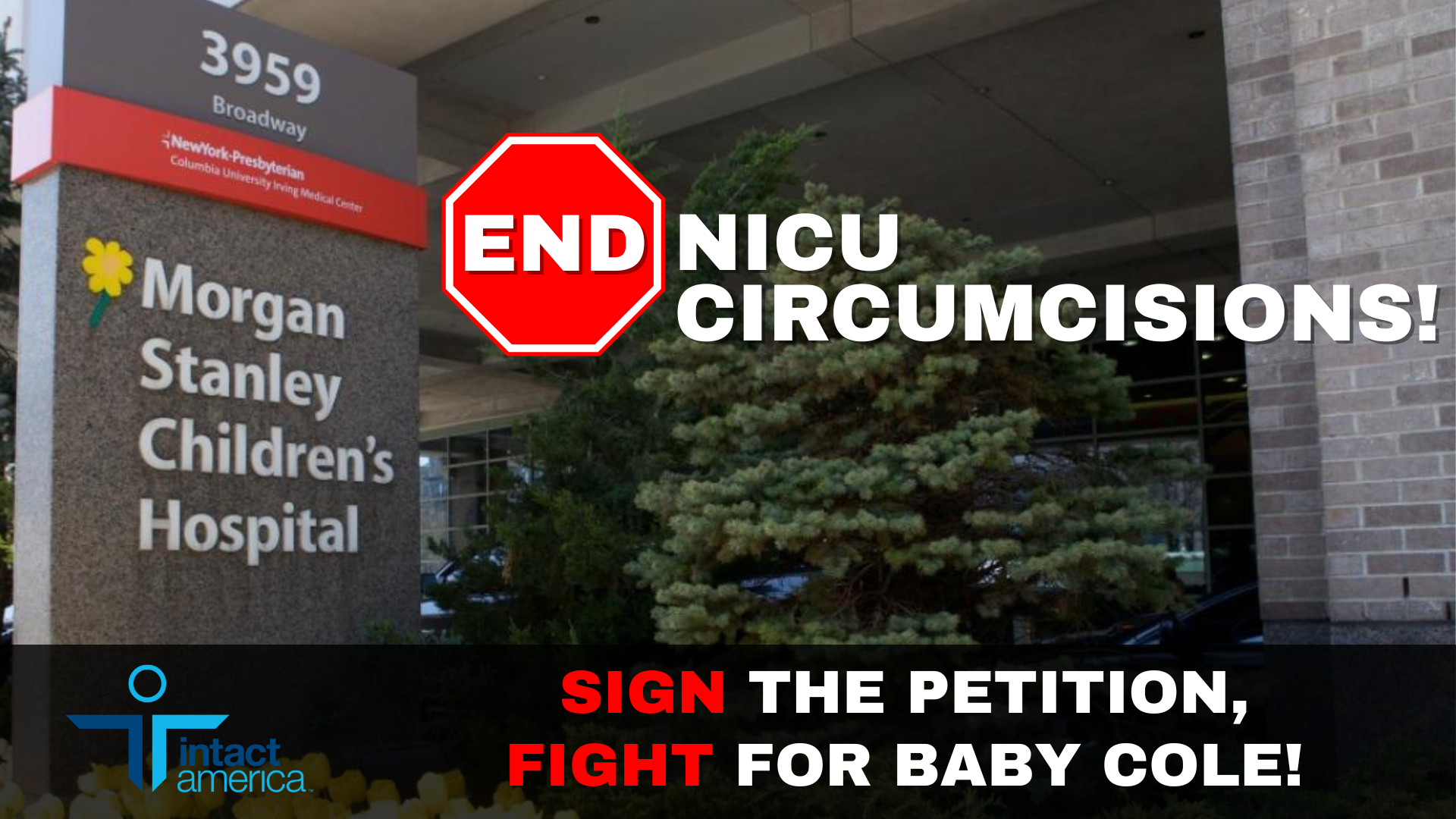The media overlooked an important story late last month that should dramatically change how doctors and hospitals treat newborn babies. On January 25, the American Academy of Pediatrics (AAP) announced a study updating its recommendations on avoiding, minimizing, or treating pain in infants. The AAP statement cites research showing that many “routine” interventions are extremely painful and that there are both short- and long-term consequences of babies’ exposure to painful stimuli.
Now that the AAP is asking health facilities to implement “a pain-prevention program … minimizing the number of painful procedures performed” on newborns, we need to ask again why doctors continue to circumcise nearly a million baby boys a year in the United States. Unlike other painful stimuli the AAP cites, including heel punctures or IV insertion, circumcision is a protracted surgery that does not diagnose or treat any illness, but rather subjects tiny boys to extreme pain for a medically unnecessary procedure.
Until recently, circumcisions have been carried out with no pain relief at all. Instead, practitioners used only physical restraints. Even today, it’s estimated that as many as half of circumcising doctors do not employ analgesia, and that the methods used the rest of the time are only partially effective, if not outright dangerous. (“EMLA,” a topical anesthetic cream widely used in U.S. hospitals, is specifically contraindicated for use “on the genitals of children” in the United Kingdom.
Unfortunately, as the AAP statement acknowledges, it’s nearly impossible to manage pain in infants, given their small size and vulnerability to chemical interventions – even the questionably effective and widely used sugar pacifiers. Implicit throughout the AAP statement is the fact that the safer the analgesic, the less effective it is in eliminating pain.
The next step
Now that the AAP has gone on record to affirm that babies feel and suffer the consequences of pain, and should not be subjected to painful procedures if they can be avoided, the logical next step is for the AAP to call unequivocally for doctors to stop circumcising babies. In its 86-year history, the AAP has never recommended circumcision and has always held that it’s not medically necessary. But, recently, as more and more parents opt out of the procedure for their boys, the trade association’s enthusiasm for circumcision has only increased. In 2012, while admitting that the complications and risks of infant circumcision have never been studied systematically, the AAP took the regrettable position that the operation’s benefits outweigh the risks.
Medical experts from around the world disagree. In response to the AAP’s 2012 statement, a large group of European physicians and ethicists wrote, “Cultural bias reflecting the normality of nontherapeutic male circumcision in the United States seems obvious, and the report’s conclusions are different from those reached by physicians in other parts of the Western world… [Their claims of] health benefits… are questionable, weak, and likely to have little public health relevance in a Western context.”
Notably, far fewer than 10% of adult men in Europe are circumcised, compared to 75% of the adult male population in the United States.
Now we have a systematic study about the short- and long-term risks of pain inflicted upon infants. This is all we need to know in order for the AAP to stand up and say to its members: “Removing a boy’s foreskin is not medically necessary, it is painful, and the pain may compromise his neurological development for years hence. The AAP recommends that the circumcision of male infants cease.”
In my experience, the more you know about circumcision, the more you oppose it. One important fact is that the foreskin is not “extra skin,” but a natural, necessary part of the male anatomy that protects the head of the penis, provides natural lubrication, and enhances sexual pleasure for men and their partners. In 2011, a study published in the International Journal of Men’s Health found that circumcised men have a 4.5 times greater chance of suffering from erectile dysfunction than intact men.
As an activist, bioethicist, attorney and, most importantly, a mother, I feel a glimmer of hope when I read the AAP’s new policy statement. I see a medical organization increasingly boxed into a corner as it tries to escape the inevitable: infant circumcision is not medically necessary, it is unethical, and it has no place in legitimate medical practice. The organization, which pledges its commitment to “the optimal physical, mental, and social health and well-being for all infants, children, adolescents, and young adults,” thus has no legitimate path other than to tell its physician members to stop circumcising baby boys.
Georganne Chapin
February 13, 2016










RewriteLady
February 14, 2016 2:15 amThanks for all the work you do to end this painful and senseless tradition!
Dan Bollinger
February 14, 2016 6:08 amPhysicians created this travesty 150 years ago. Here is their chance to correct their collective mistake. If they don’t, then we’ll know their true character, and it will be up to us to stop them from harming more children with “bad medicine.”
Sanford (Sandy) D'Esopo
February 14, 2016 8:11 amI still can’t understand why the AAP, AMA, CDC, and other organizations concerned with health care have not, so far as I can tell, responded to the findings of Danish researcher Morten Frisch. Nor has, again so far as I can tell, Intact America, DOC, or others seeking to prevent neonatal circumcision raised Frisch’s findings that couples more often fail to enjoy satisfactory sex when the male is circumcised. Or, worse still, boys cut at birth or early childhood have a significantly higher rate of autism spectrum disorder. These powerful arguments against circumcision need to be made known.
Steinn
February 15, 2016 1:32 amI totally agree. Those findings are imprtant, a 46 % increased risk of getting autism is highly significant.
Marilyn Milos
February 14, 2016 10:10 amBrilliant piece! Thank you. Hopefully the AAP will take heed and make a clear, honest statement about the harmful effects of circumcision. It’s their only moral and ethical course of action.
Marilyn
Pratt Landry
February 14, 2016 3:44 pmInteresting but questionable concept of circumcision in general, pain, and long term effects. I wonder how many of the participants in this blog have the same concerns about abortions – especially long term.
Sanford (Sandy) D'Esopo
February 14, 2016 4:15 pmPratt, Both circumcision and abortion are ethical and moral issues as well as medical. However, I see no reason one can’t support or oppose one independently of the other. Whether one thinks abortion is wrong or not has no bearing on whether a boy’s foreskin should be amputated without his consent. The two issues are not related.
Dan Bollinger
February 23, 2016 11:19 pmPratt, your comment sounds trollish, to me. But if not, then Sandy’s comment sums it up nicely. As activists like to say, “Don’t mix issues!”
Laird
February 14, 2016 4:49 pmWhy would now admitting that they have been wrong based on current knowledge be so difficult? It’s not as if circumcision is a lucrative surgery. Perhaps they fear lawsuits? Would a class action suit to stop the practice be feasible?
Dan Bollinger
February 23, 2016 11:17 pmLaird, I had an obstetrician once tell me, “I love doing circumcisions They make my Mercedes payments!” And it is true. A busy doctor will make as much just from chopping baby boy penises as the average American does working forty hours all year long.
Steinn Andersen
March 4, 2016 12:58 pmGenital mutilation is a billion dollar business in the great US of A.
GrossedOut
February 23, 2016 6:25 pmYeah… but…. I find the whole “dick cheese” thing a turn off. No sex with that!
MW
February 23, 2016 10:34 pmThis sounds like a hygiene issue, not an anatomy issue. I have never had a partner, circumcised or intact, who cultivated ‘dick cheese’.
Dan Bollinger
February 23, 2016 11:14 pmDear GrossedOut, I think your response is knee-jerk or argumentative. Women produce as much or more “vulva cheese” and yet they seem to be able to keep themselves clean.
BH
February 24, 2016 1:55 amDarling.. you have no idea… dick cheese doesn’t exist with good hygiene…
Sanford (Sandy) D'Esopo
February 25, 2016 8:01 amI don’t see much difference in the sight or odor of an uncircumcised penis and a vagina. In any case, for generations we Americans have been brainwashed into hating our bodies, especially its natural scents. When Dial soap created the ad line, “Dial takes the worry out of being close,” what they really did was put the worry INTO being close. Untold billions have been made by convincing us to be ashamed of ourselves. One final question: why, in so many cultures, are the genitalia the only body parts deemed unacceptable as God or nature made them?
Donna May
February 24, 2016 1:46 pmhttp://www.cbc.ca/news/health/female-genital-mutilation-legal-1.3459379
Two genocilogists favor legal genital mutilation of girls.
Suzan D Reed
February 25, 2016 7:37 amWhich is why I am glad my Kids’ Ped, had me get them “milk drunk” and used a shot of novocaine to numb the boys before they were cut. No pain.
Pingback: More INCONVENIENT TRUTH - Binnie A Dansby.com
February 25, 2016 7:44 am